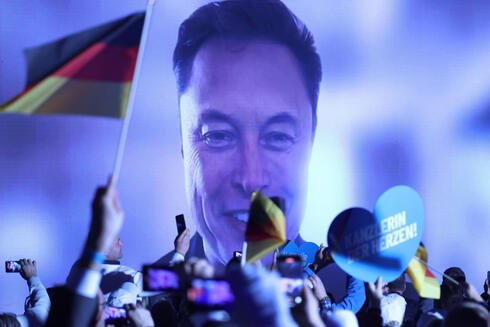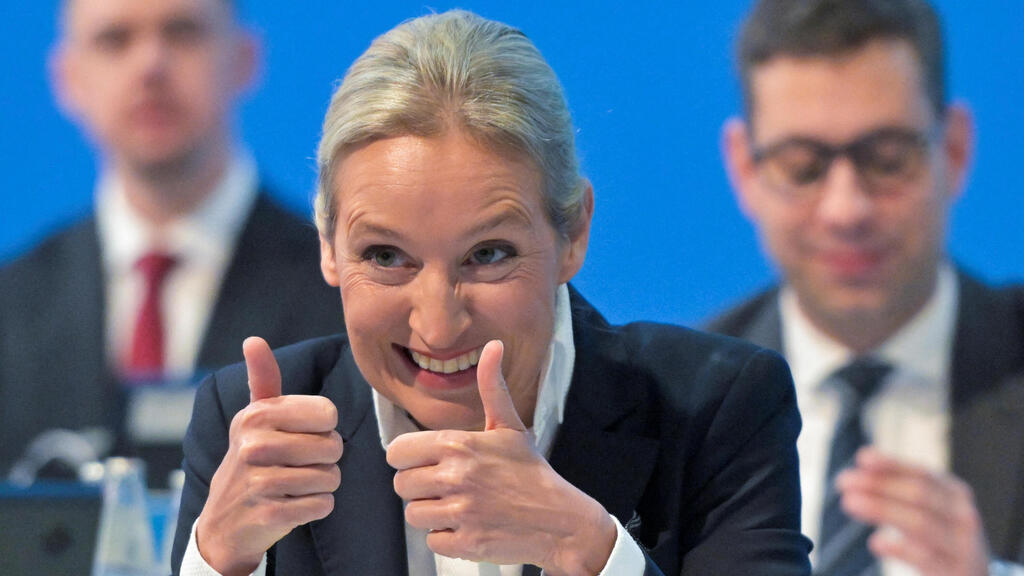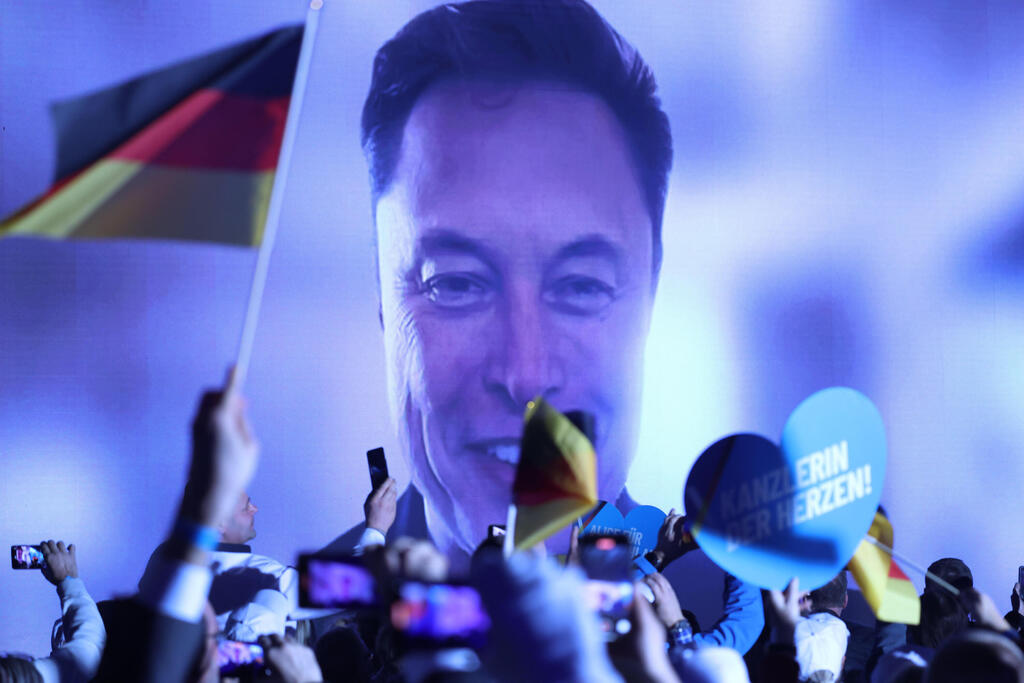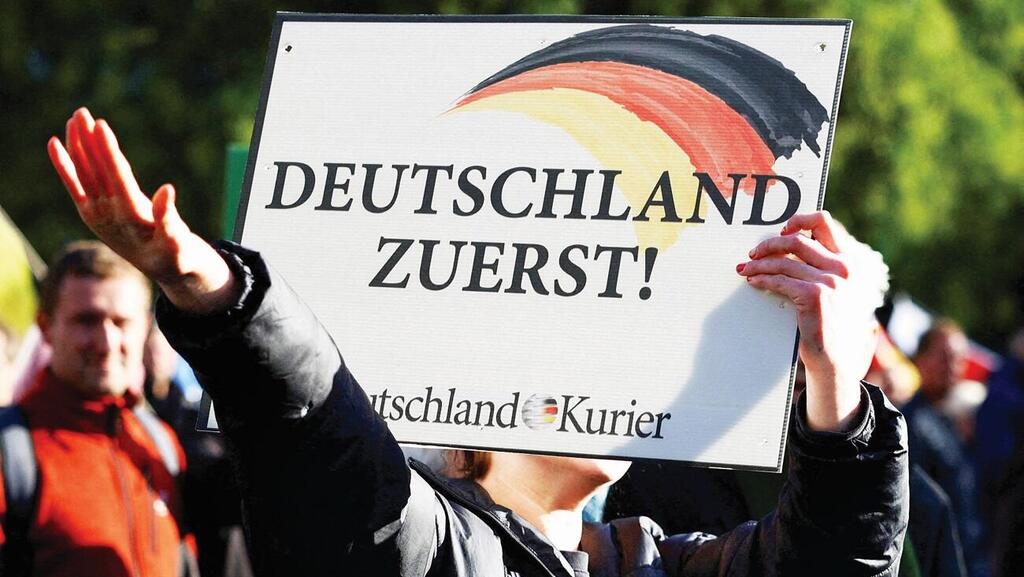Concerns about Holocaust trivialization and nationalist policies underscore the growing anxiety over the influence of the far-right party, which evolved into a powerful political force and recently won the endorsement of Elon Musk
Nathan Klabin/The Media Line|
The AfD was founded in 2013 as a movement critical of the European Union. In the years since, it’s evolved into a powerful political force, blending anti-immigration rhetoric with nationalist policies. Following the collapse of Chancellor Olaf Scholz’s three-party government last November, the AfD has capitalized on discontent over Germany’s open borders and economic policies, drawing voters disillusioned with traditional conservative parties.
The far-right party has been in second place in the most recent polls for the general elections, raising concerns among Jews in Germany and abroad. The party has expressed strong support for Israel, especially following the October 7 attacks, but party leaders have also been accused of trivializing Holocaust history. Some are concerned that relations with Israel and the German Jewish community could be affected even if the party doesn’t have enough popular support to win the chancellorship. With the federal elections getting closer, the rise of the AfD forces a critical question: Under a party pushing such divisive rhetoric, could Germany remain a modern democracy rooted in historical responsibility?
In December 2024, Elon Musk, the billionaire entrepreneur behind Tesla and SpaceX, publicly endorsed the party, stating on his social media platform X that “only the AfD can save Germany.” He further supported the party by authoring an op-ed in Die Welt, criticizing traditional parties and advocating for the AfD’s platform. In January 2025, Musk hosted a livestream with AfD leader Alice Weidel, discussing various topics and bolstering the party’s visibility. Later that month, he made a virtual appearance at an AfD campaign rally in Halle, addressing 4,500 attendees and emphasizing the importance of preserving German culture while moving beyond past guilt associated with the Nazi era. Musk’s involvement has been met with significant criticism from German political figures, including Chancellor Olaf Scholz, who condemned his actions as interference in Germany’s democratic process. Additionally, during President Donald Trump’s 2025 inauguration, Musk faced backlash for making a gesture resembling a Nazi salute, which he dismissed as an overreaction.
Emmanuel Navon, an international relations lecturer at Tel Aviv University and senior fellow at the Jerusalem Institute for Strategy and Security, attributed the AfD’s appeal to the disillusionment of traditional conservative voters in Germany.
“Angela Merkel’s policies on immigration and the economy alienated segments of the electorate who now find refuge in the AfD,” according to Navon. The AfD has capitalized on fears of immigration and the erosion of national identity, he said, themes that resonate deeply in many European nations facing similar political shifts.
Similarly, Carsten Ovens, executive director of a German organization devoted to promoting relations between Israel and European countries, said that the AfD’s growth is part of a broader trend of polarization in Germany exacerbated by economic crises and societal transformations. “Since the reunification of Germany, the eastern regions have faced rapid systemic changes,” Ovens, a former member of the Hamburg state Parliament, said, pointing to the financial crisis of 2008 and the 2015 refugee crisis as critical junctures increasing polarization.
4 View gallery


Protesters clash with police outside the AfD Party conference
(Photo: Matthias Rietschel/Reuters)
This polarization, Ovens said, has nurtured extremism on both ends of the political spectrum. “While the AfD’s strength is particularly pronounced in the east, it has become a nationwide problem,” he said. “The AfD at its core is a racist and antisemitic party and a threat to Jewish life in Germany and abroad.”
Indeed, the AfD’s growth has sparked anxiety within Germany’s Jewish community. While most antisemitic violence in Europe today stems from far-left and Islamist groups, the AfD’s rhetoric concerning Germany’s Nazi past has drawn sharp criticism from Jewish groups. Alexander Gauland, the party’s honorary chairman, infamously referred to the Holocaust as merely “a speck of bird poop in more than 1,000 years of successful German history.”
Ovens said that the party’s historical revisionism alienates Jewish communities both domestically and internationally. “A party that trivializes the Holocaust cannot be a partner for Jewish life in Germany or Israel,” he said.
Should the AfD gain more influence, its foreign policy could strain Germany’s traditional role as a mediator in the Middle East and undermine Western cohesion
Andreas Friedrich Horst, spokesperson for leading AfD member Beatrix von Storch, squarely rejected the claim that AfD leaders had made antisemitic remarks. He said that leftists had “wrongly and maliciously” accused AfD members of antisemitism in order to distract from antisemitism on the left.
“It is the left that compares the Holocaust with immigration restriction and the war in Gaza. For the AfD, Jewish life belongs to Germany and has to be protected, [and] Israel is the only Western democracy in the Middle East and an important ally in the fight against Islamic terrorism,” he said.
Horst attributed the success of the AfD to the dissatisfaction of many Germans with open borders, the abandonment of nuclear and coal power, and “gender ideology.” “When I grew up, this was the agenda of the radical left. Today, it is the agenda of the political mainstream,” he said. “Angela Merkel made it the official policy of the Christian Democrats. People are fed up with this, and they want to go back to normal. This is true not only in Germany but also in all Western countries. The roots for the success of the AfD are the same as for the success of Donald Trump.”
According to Navon, some of the values celebrated by the AfD are also associated with Israel – namely, national pride, security, and economic success. He said that many on the far right also see Israel as a “bastion against radical Islam.”
Similarly, Ovens said that the AfD often uses a pro-Israel stance “as a fig leaf to obscure its Islamophobia.”
After the attacks of October 7, 2023, honorary AfD chair Gauland said that “The attack was not only aimed at the Jewish state, it was also aimed at us. Israel is the West in an environment that rejects and fights the West. When we stand with Israel, we are also defending our way of life.”
But in October 2024, Tino Chrupalla, one of the AfD’s co-chairs, called for an end to arms deliveries to Israel. “This highlights the party’s hypocrisy,” Ovens says. “It is easy to express support when it costs nothing, but their actions tell a different story.”
Furthermore, the AfD, like other far-right European parties, often supports Russia, Navon said. “This is problematic for Israel because of Russia’s alignment with Iran and its efforts to undermine US-led global order in tandem with China,” he said. “Such alliances are contrary to Israel’s strategic interests.”
Should the AfD gain more influence, its foreign policy could strain Germany’s traditional role as a mediator in the Middle East and undermine Western cohesion, Navon said.
Defending the AfD point of view, Andreas said that the prime ministers of Israel and Russia have built up a strong relationship and that Israel has refused to sanction Russia. “If we want to stop the Iranian nuclear program, it is much better to look for diplomatic support in Moscow then to make Russia an enemy,” he said.
Both Ovens and Navon said that the rise of the AfD is unlikely to disrupt official ties between Israel and Germany, two countries that have cultivated a unique relationship rooted in shared values and historical responsibility. “The broad majority of German political parties support the partnership with Israel,” Ovens said. But he warned that the AfD’s influence on public discourse could have indirect effects.
As the German general election inches closer, Andreas believes that domestic issues will determine the victor at the ballots. “We need a new immigration policy, new energy policy, investment in our rotten infrastructure, stopping spending money for migration, climate, gender and other ideological nonsense, and reducing the tax burden on companies and citizens,” he said.
If they want to beat the AfD, traditional conservative parties will have to address issues like immigration and integration head on, Navon said. He said that ignoring these concerns will only bolster the AfD’s influence.
This article is written by Nathan Klabin and reprinted with permission from The Media Line



